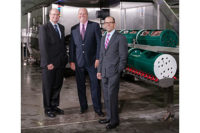When West Liberty Foods announced in February it had received third-party certification of its landfill-free status at its Tremonton, Utah, processing facility, surprise should not have been an initial reaction from others in the meat- and poultry-processing industry.
Simply stated, the West Liberty, Iowa, processor has taken the role of industry trailblazer in times past, through a variety of channels, whether related to food safety, slicing-room design or even owning and operating a standalone children’s day-care center for its employees’ families.
Now, after less than a year of program initiation and development, the Tremonton facility touts itself as the first U.S. meat-processing plant to become landfill-free (by presstime, the Mount Pleasant, Iowa, facility had garnered certification as well, with the West Liberty, Iowa, facility expected to gain certification shortly thereafter, making the company completely landfill-free).
Ed Garrett, president and CEO, was inspired to make the company landfill-free while attending a convention on sustainability, and he brought the challenge to his team to do the right thing for the environment and future generations.
“Households can do a lot of recycling at home, but they still have to send product to the landfill every week — they've still got to take trash out,” he explains. “So, it's really companies like us that need to step up, offset that and create balance. That is, if we don't send anything to the landfill, we offset a lot of households that do have to send material there.”
| “Households can do a lot of recycling at home, but they still have to send product to the landfill every week — they've still got to take trash out,” he explains. “So, it's really companies like us that need to step up, offset that and create balance. That is, if we don't send anything to the landfill, we offset a lot of households that do have to send material there.” |
Initially, the challenge accepted by the West Liberty Foods team may have appeared daunting, based on the sheer amount of coordination required — centered around waste elimination, rather than product creation.
“Raw materials come in and out of [Tremonton] to the tune of five million pounds a week,” Garrett says. “Then, add all the packing supplies, all the ingredient bags, all the lunches that the associates bring in, and the assorted office waste generated, and the associates probably thought this would be impossible at first.
“Then, once they got out and started seeing what really made up our waste stream, the associates got pretty excited about it,” Garrett adds.
Gerald Lessard, vice president and COO, recounts the fact that the associates figuratively — and in some ways, literally — jumped in to assess that waste stream.
“Dumpster diving became a big idea that really opened our eyes to what was going to the landfills,” he says. “It gave us this opportunity now to work out how and where we could divert different materials away from the landfill.”
Not only did the West Liberty Foods associates take part in the waste-stream sorting exercise, but the company invited Hillside Recycing and other waste vendors and partners to help sort through the trash, says Michele Boney, environmental compliance officer for West Liberty Foods.
“It was easier to figure out what our vendors couldn't take, and then find an outlet for those items than it would have been if we’d asked the vendors who could take what materials and where those materials would go,” she explains. Once the team had sorted through the waste stream and identified recyclable material, the challenge became one centered around employee education and engagement.
According to Garrett, although the company had an ongoing recycling program, the intensity around the landfill-free challenge forced a reconditioning of everyone in the company — executives notwithstanding.
“You put out the recycling containers, you put out the signs, you remind them every time they get done with a piece of trash or a recyclable item that there's a home for it,” he says. “But it wasn't just our associates, it had to involve everyone, top to bottom. Instead of just leaning back and throwing a plastic cup in the trash can as I might have done in the past, I've got to walk to the recycling area where the plastic cups go.”
On the production floor, subtle changes had to be made as well, explains Dave Frett, plant manager for Tremonton.
“In each slice cell, for example, you've got casings that have protein residue on them, and those will go into one bin,” he says. “The clean plastics that haven’t been soiled will go into another bin, so it’s sorted initially there, right on the production floor.”
When Frett saw that employees had bought into the production floor sorting requirements, he knew they had really latched onto the program, because it would be just as easy for an employee to maybe pay less attention to those duties when tasked with many other responsibilities directly related to the production lines. But Tremonton’s employees followed through on the execution.
In order to bring validity to the claim of “landfill-free,” Garrett required that the company find a third-party auditor to certify the claim, and West Liberty Foods worked very closely with NSF International to develop audit criteria and earn the certification. According to Boney, such a task demanded sharply focused documentation of the logistics of the program, on through to recording information about the vendors who took the material from West Liberty Foods and where they carted it.
Although one key component of West Liberty Foods’ landfill-free program was to purge the waste stream of all materials that could be sorted and recycled, the Tremonton facility needed to find a destination for the trash that could not be recycled or reused — such as the multi-layer plastics or plastic casings soiled with protein residue, which the company’s plastics vendor could not accept.
Fortunately, just prior to Garrett bringing the challenge to the company, Boney says West Liberty Foods had been contacted by an Iowa cement company about using the company’s waste as a fuel source.
|
“We called them up to see what kind of products would they take, and they would take anything that we had to burn,” Boney adds. “Wasatch pipes the steam generated from burning our waste to Hillside Air Force Base, and they utilize it to power their boilers, saving on natural gas.” |
“They were very interested in our products and wanted to be able to burn that instead of burning coal,” she explains. Today, any West Liberty Foods trash coming from the Iowa facilities goes to that company, where it is used to fire the kiln. In Tremonton, West Liberty Foods’ team needed to do some research and legwork to find a similar setup. They got word of a company south of the city in Wasatch County — Wasatch Integrated Waste, near Hillside Air Force Base — that had an incinerator and stepped to the plate.
“We called them up to see what kind of products would they take, and they would take anything that we had to burn,” Boney adds. “Wasatch pipes the steam generated from burning our waste to Hillside Air Force Base, and they utilize it to power their boilers, saving on natural gas.”
At West Liberty Foods, the waste that would end up in a landfill under different circumstances ends up providing a residual benefit as a source of energy for another company — reducing the need for coal and natural gas.
Moving forward, Frett has challenged his team in Tremonton to further reduce the amount of material that is sent to the incinerator — the non-recyclable trash that has no other use but be burned as an energy source. At presstime, Frett reported that Tremonton had already reduced that amount by roughly 20 percent from April to May 2012. And a further reduction could be on tap, adds Boney, if the company can find the right solution to clean the protein-soiled plastic casings that currently go to the incinerator rather than into the plastics recycling stream.
“We have looked at a plastics cleaning machine [that] cleaned them just using water,” she says. West Liberty Foods would already have one of these machines, except that the technology isn’t perfected to match the company’s needs just yet. The force of the cleaning action caused the soiled packaging to not only shed the meat residue, but also tiny bits of plastic, which contaminates the meat residue collected. Once the manufacturer solves that issue, West Liberty Foods expects to take the next step and begin cleaning those plastics.
As West Liberty Foods continues to step outside the box and often succeed where others dare not blaze a trail, the employees become more confident about stepping off the beaten path and innovating. Lessard believes that West Liberty Foods’ successful history helped the associates feel comfortable taking on the challenge of achieving landfill-free status.
“It's such a dynamic organization that each one of these successes has a tendency to build on another one,” he says. “Every one of these accomplishments winds up helping us get past the next activity down the pike. [It builds] upon the confidence that the team already had in place and takes it in different directions.”
Today, Garrett hopes West Liberty Foods’ success in going landfill-free will encourage the rest of the industry to follow suit. He says some of West Liberty Foods’ customers have gotten behind the landfill-free initiative and actually challenged other suppliers to do the same. It’s the kind of good news that the industry needs to accomplish and promote in order to combat much of the negative focus that hits consumers squarely in the eyes.
“The industry has established that it’s a good steward of the environment, but I don't know if processors have really dug in to their own backyard to find out what's coming out of it,” Garrett says. “They need to follow the trash truck to the landfill and see what is coming out. Once we did that, we realized it wasn't going to be very hard to achieve landfill-free status.
“I think the industry is probably pretty close, and I think it could take that next step and get certified as well — processors just have to follow the truck.”
Meanwhile, as West Liberty Foods shares its success with the industry, Garrett says it will be taking additional steps to make itself an even better steward in its communities.
“We're really concentrating on protecting our environment,” he says. “We're doing a lot of work on reduction of water, but not just the typical reduction.
“Can the process be different? Can we clean with a different style instead of using so much water? Can we chill product without using so much water?” he adds. “Not just reducing what use in water and energy, but can we do something totally different to reduce the water and the energy?”
Certainly, West Liberty Foods’ associates will be ready and waiting to blaze a trail for the industry once again — learning from missteps and celebrating successes, whether protecting consumers with a safe food product or protecting the environment around its facilities.









Report Abusive Comment